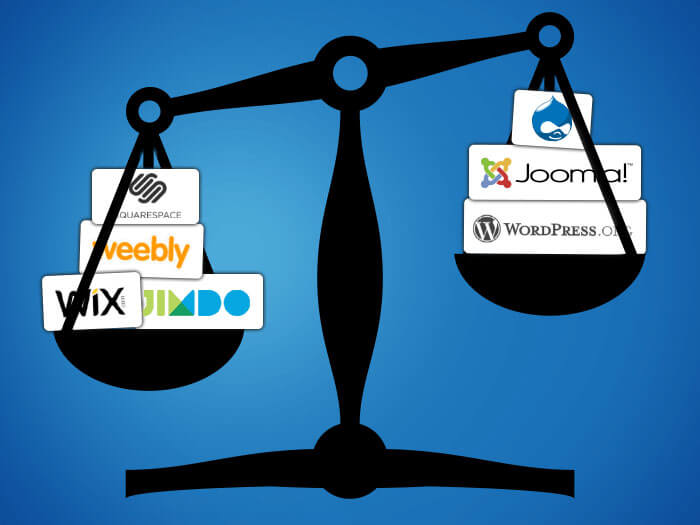Content management systems (CMS) and website builders are two of creators’ most common tools to put their sites online. If you’ve heard of platforms like WordPress, Wix, and Squarespace, you’re already familiar with these services.
However, you may not know as much about the differences between a CMS and website builder and what those differences may mean for your site. Let’s take a closer look at how a CMS and a website builder are different as well as their pros and cons for different creators.
Key takeaways:
- As a management system for content, a CMS is a platform that allows users to store, publish, delete, and modify content in a database.
- The term “website builder” generally refers to all-in-one platforms designed to streamline the process of creating a website.
- Website builders are usually the straightforward option while a CMS tends to be more customizable. Every platform is different, so take some time to evaluate each of your options fully or even start with a free trial to get a feel for different providers.
What Is a CMS?
As a management system for content, a CMS is a platform that allows users to store, publish, delete, and modify content in a database.
The most common CMS in 2023 is WordPress, which claims to power 43% of all websites on the internet. However, there are many other CMSs with active communities that could be a better fit for some websites.
Content management systems are often associated with blogs, but they can work well for many other kinds of sites. While some CMS providers offer other services, a CMS itself doesn’t include hosting, domain names, or other secondary features.
What Is a Website Builder?
The term “website builder” generally refers to all-in-one platforms designed to streamline creating a website. Typically, website builders are hosted by the provider, so users don’t need to worry about finding a host.
With a website builder, you’ll have the opportunity to select a theme and make changes by dragging and dropping elements around the screen. While CMSs can often be expanded with third-party apps and extensions, website builder providers usually manage all the functionality available on their platforms.
Which Is Better: a CMS or a Website Builder?
Time to Launch: Website Builder
If you’re looking for the easiest way to set up a new website, you should probably learn about a website builder. Website builders come with more integrated services, which means you’ll be able to get a site up and running with much less legwork. If you’re OK with the basic design, you can pick a template and start developing content.
Instead of looking for a host on your own, you can create and publish your site immediately through the provider’s hosting. Website builders get you straight to the point as quickly as possible with preset themes and simple drag-and-drop tools for anyone to learn.
Coding: Website Builder
You don’t need to know how to code to use a CMS, but it helps. The further you change your site from the vanilla version, the more complex your setup becomes. Creators who want to avoid coding should therefore avoid a CMS unless they’re up to the challenge and want some of the deeper customization options.
Alternatively, you can hire a developer with experience with your CMS. The downside of this approach is that professional development is generally expensive, which could significantly increase the overhead costs of a growing website.
Customization: CMS
Website builders tend to be the easiest option, but content management systems offer a more powerful toolkit for users who want to customize their sites. Popular CMS services like WordPress also have thriving communities of third-party creators that build plug-ins to add to the platform’s functionality.
While website builders provide some flexibility, they also come with many limitations. Since website builders control the entire platform, they’re not usually as open to changes from third-party applications.
Ability to Migrate: CMS
Additionally, a CMS-based website can be moved between hosts relatively easily while the same process is more complicated for sites developed on website builders. If you go with a website builder, you’ll need to keep paying that same provider to access hosting and other key features.
If you opt for a CMS, you’ll be able to move hosts, change domain names, and make other changes to your site at will. The CMS is ready to integrate with whatever systems you want to use. Creators who want full control over their websites should go with a content management system over a website builder.
Cost: Depends
You could make an argument for either website builders or a CMS as the cheaper option, but the truth is that this comes down to the specific configuration. It’s impossible to predict how much you’ll end up spending without knowing the specifics of your site.
On one hand, a CMS is typically cheaper than a website builder at the surface level. A CMS is often free, with WordPress being the most prominent example. Some website builders offer a free option, but most free versions come with intrusive branding and other restrictions that make them less practical.
Even though you won’t spend any money on a CMS itself, you could easily spend much more than you would with a website builder. Hosting, development, third-party applications, and other expenses can add up quickly compared to the small monthly fees of most website builders.
Similarly, website builders prominently advertise their lowest rates, but you may end up upgrading as your site grows and you need more features. You shouldn’t assume that a website builder is cheaper based on the price of its most affordable subscriptions.
Should You Use a CMS or a Website Builder?

When deciding between a CMS and a website builder, you must answer a few basic questions about yourself and your brand.
Do you or someone on your team have development skills, or are you willing to invest in professional development? If not, then you might be better off with a website builder. A CMS almost always takes more work than a website builder, so it’s not a good option for creators who want the simplest solution.
Meanwhile, if you want full control over your site’s direction, you won’t be satisfied with a website builder. With relatively limited functionality, you won’t be free to fully customize the site.
While website builders are usually the straightforward option and CMSs tend to be more customizable, the truth is that every platform is different. Take some time to evaluate each of your options fully or even start with a free trial to get a feel for different providers. The important thing is to find a platform that aligns with your workflow, needs, and budget.
